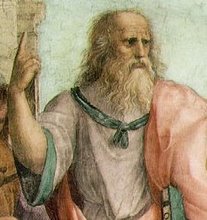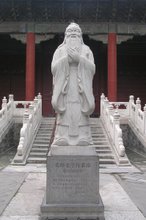The rise of the Golden Age of Chinese Philosophy came during a turbulent period in the history China. It began in what is known as the Spring and Autumn period and extended through the Warring States period. Most of the well-known Chinese philosophies come from this epoch. And as an interesting side note, it corresponds roughly to the same period in Classical Greek Philosophy. Over the next few entries I will be investigating the rise of this period in the philosophies of the East, looking into Confucius, Han Feizi, Laozi, and other notable figures from that era.
Sunday, September 9, 2007
Friday, September 7, 2007
Gorgias (487 BC - 376 BC)

Lifespan: born 487 BC - died 376 BC
Primary Base of Operations: Greek cities of Leontini and Attica
Schools of Thought: Sophism
Other Occupations: Rhetorician
Teacher: Empedocles
Primary Base of Operations: Greek cities of Leontini and Attica
Schools of Thought: Sophism
Other Occupations: Rhetorician
Teacher: Empedocles
- considered by many to be one of the founders of Sophism.
- Gorgias begins his argument by presenting a logical contradiction, "if the nonexistent exists, it will both exist and not exist at the same time" (a violation of the principle of non-contradiction). He then denies that existence (to on) itself exists, for if it exists, it is either eternal or generated. If it is eternal, it has no beginning, and is therefore without limit. If it is without limit, it is "nowhere", and hence does not exist. And if existence is generated, it must come from something, and that something is existence, which is another contradiction. Likewise, nonexistence (to mê on) cannot produce anything. The sophist then explains that existence can neither be "one" (hen) or "many" (polla), since if it were one, it would be divisible, and therefore not one. If it were many, it would be a "composite of separate entities" and no longer the thing known as existence.
- some call him the first nihilist.
- he remarked, "if things considered [imagined or thought] in the mind are not existent, the existent is not considered", that is to say, existence is incomprehensible.
- Gorgias begins his argument by presenting a logical contradiction, "if the nonexistent exists, it will both exist and not exist at the same time" (a violation of the principle of non-contradiction). He then denies that existence (to on) itself exists, for if it exists, it is either eternal or generated. If it is eternal, it has no beginning, and is therefore without limit. If it is without limit, it is "nowhere", and hence does not exist. And if existence is generated, it must come from something, and that something is existence, which is another contradiction. Likewise, nonexistence (to mê on) cannot produce anything. The sophist then explains that existence can neither be "one" (hen) or "many" (polla), since if it were one, it would be divisible, and therefore not one. If it were many, it would be a "composite of separate entities" and no longer the thing known as existence.
- some call him the first nihilist.
- he remarked, "if things considered [imagined or thought] in the mind are not existent, the existent is not considered", that is to say, existence is incomprehensible.
Subscribe to:
Posts (Atom)



